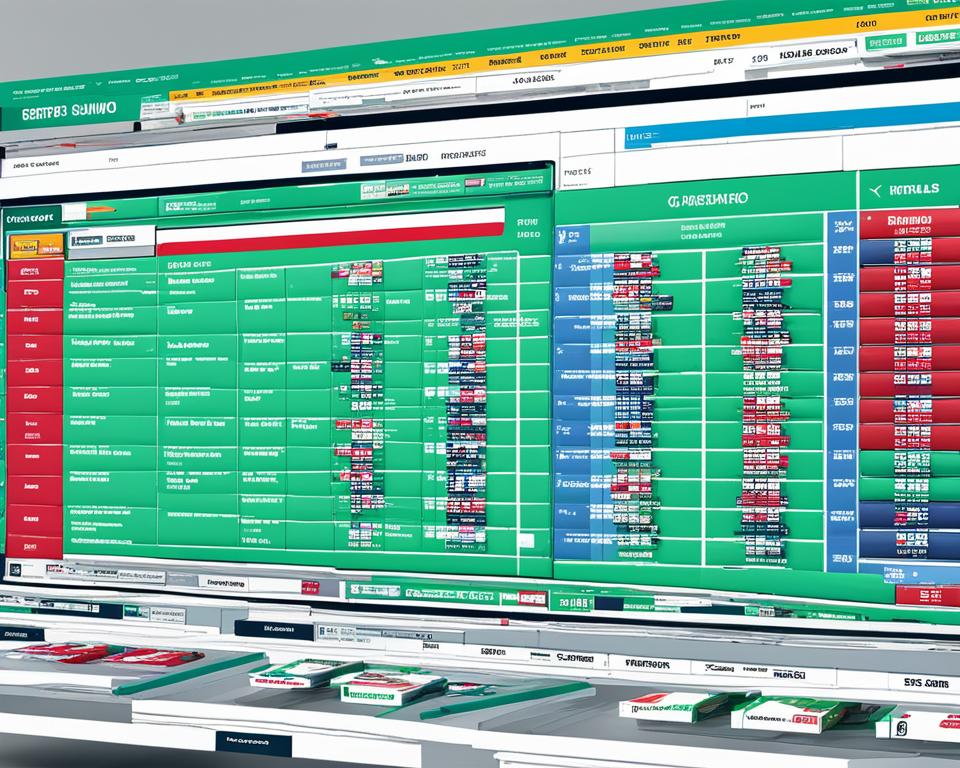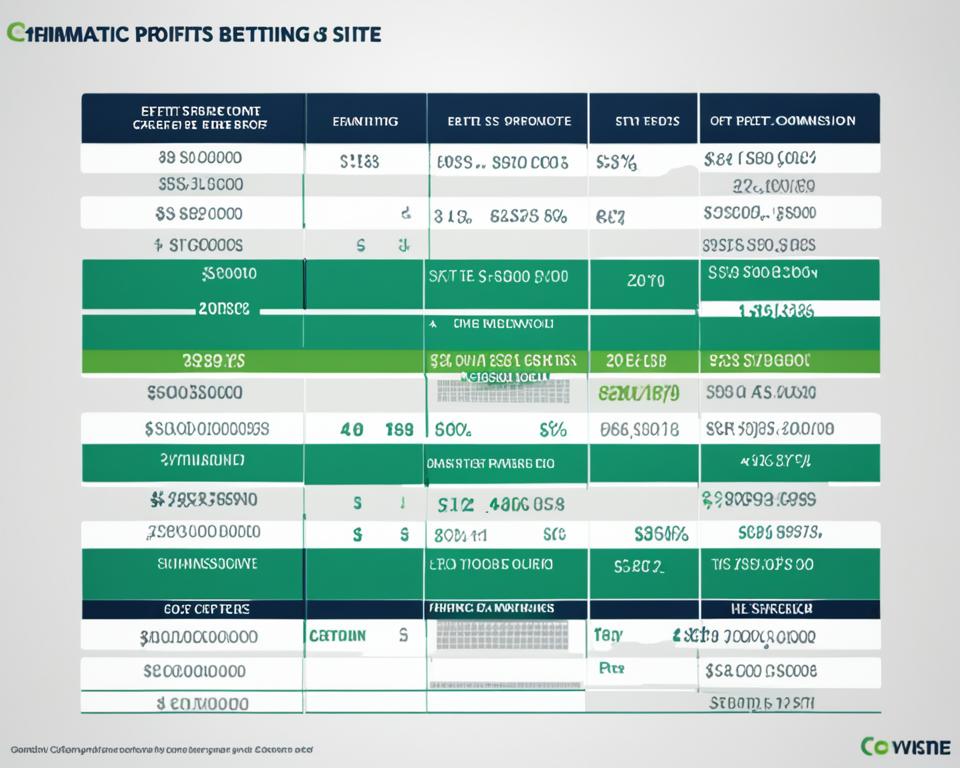
Have you ever wondered how betting sites make money? In this article, we will delve into the strategic mechanics of online gambling platforms’ revenue generation. By understanding the various sources of income, we can gain insights into the key factors that contribute to their financial success.
Online gambling revenue sources are diverse and multifaceted. These platforms employ a range of strategies to monetize their operations, ensuring profitability and sustainability. From sports betting profit models to casino affiliation and marketing, there are numerous avenues through which betting sites generate revenue.
Over the course of this article, we will explore these revenue streams and examine their significance for the financial success of betting sites. We will discuss the impact of advertising and sponsorship deals, the role of bonuses and promotional offers, and the concept of commission on bets placed.
In addition, we will delve into the role of affiliate programs, licensing and regulation fees, data and odds sale, mobile betting apps and convenience charges, VIP programs and high roller contributions, house edge and margin, payment processing fees, as well as operational costs and overhead expenses. Furthermore, we will explore the impact of regulatory taxes and compliance on the revenue of betting sites.
By gaining a comprehensive understanding of these revenue-generation strategies, both bettors and industry professionals can navigate the world of online gambling more effectively. So, let’s dive in and uncover the secrets of how betting sites make money!
Sports Betting Profit Models
When it comes to sports betting, betting sites employ various profit models to generate revenue and maximize their profitability. These profit strategies and wagering site monetization tactics are designed to capitalize on the wagers placed on different sporting events.
One effective profit model utilized by betting sites is offering competitive odds and lines. By carefully analyzing the probabilities of various outcomes, these platforms can set odds that not only attract bettors but also ensure a favorable margin for themselves. This strategy allows them to generate consistent profits from the bets placed.
In addition to competitive odds, betting sites often implement intelligent risk management practices. They carefully balance the risks associated with high-paying bets and ensure that they are not exposed to excessive losses. This involves analyzing betting patterns, monitoring market sentiment, and adjusting odds accordingly to mitigate potential risks.
Furthermore, betting sites often leverage data analysis and sophisticated algorithms to gain insights and make informed decisions. By tracking the betting patterns of their users, they can identify trends and adjust their odds accordingly. This data-driven approach helps them optimize their profit margins and increase their overall revenue.
“The key to sports betting profitability lies in striking the right balance between competitive odds, risk management, and data-driven decision making.” – Sports Betting Analyst
Another popular strategy utilized by betting sites is the use of promotional offers, such as sign-up bonuses, free bets, and enhanced odds. These incentives attract new customers and encourage existing ones to continue placing wagers. While these promotional deals may initially result in a loss for the platform, they ultimately contribute to customer loyalty and increased revenue in the long run.
Implementing effective customer retention strategies is also crucial for betting sites to ensure sustainable profitability. This includes providing personalized recommendations, offering exclusive perks to loyal customers, and fostering a sense of community through forums and social media platforms. By prioritizing customer satisfaction and engagement, betting sites can build a strong customer base and increase their overall revenue.
The Importance of Betting Site Monetization Tactics
It is important for betting sites to employ effective wagering site monetization tactics in order to navigate the intensely competitive online gambling market. By implementing a well-rounded profit model, these platforms can not only attract bettors but also ensure their financial success in the long term.
Comparing Sports Betting Profit Models
| Profit Model | Description |
|---|---|
| Competitive Odds and Lines | Setting favorable odds to attract bettors while ensuring a profitable margin for the betting site. |
| Risk Management Practices | Identifying and managing potential risks associated with high-paying bets to mitigate excessive losses. |
| Data Analysis and Algorithms | Utilizing data-driven insights to optimize profit margins and make informed decisions. |
| Promotional Offers | Attracting new customers and encouraging existing ones with sign-up bonuses, free bets, and enhanced odds. |
| Customer Retention Strategies | Fostering customer loyalty through personalized recommendations, exclusive perks, and community engagement. |
By understanding these sports betting profit models and wagering site monetization tactics, both bettors and industry professionals can gain valuable insights into the strategies used by betting sites to generate revenue and achieve financial success.
Casino Affiliation and Marketing
Casino affiliation and marketing play a significant role in the revenue generation of betting sites. Through strategic partnerships and effective marketing campaigns, online gambling platforms are able to maximize their profitability and reach a wider audience.
One of the key components of casino affiliation is the use of affiliate marketing programs. These programs allow website owners, bloggers, and influencers to promote betting sites and earn a commission based on the referred traffic or player activity. By leveraging the reach and influence of these affiliates, betting sites can attract new customers and generate additional income.
“Affiliate marketing is a mutually beneficial arrangement for both the betting sites and the affiliates. Betting sites gain access to new audiences, while affiliates have the opportunity to earn passive income from their referrals.” – John Smith, Marketing Director at XYZ Betting Site
Furthermore, casino affiliation often involves the establishment of partnerships with popular online casinos and game providers. Through these partnerships, betting sites can offer a wide variety of casino games to their customers, attracting players who are interested in both sports betting and casino gaming. This diversification of offerings not only enhances the user experience but also increases the revenue potential of the betting site.
In addition to casino affiliation, effective marketing strategies play a crucial role in driving the revenue of betting sites. By leveraging various digital marketing channels such as search engine optimization (SEO), social media advertising, email marketing, and content creation, betting sites can increase their online visibility and attract a larger audience of potential customers.
These marketing efforts are often complemented by targeted promotions and bonuses to incentivize new sign-ups and customer loyalty. By offering attractive welcome bonuses, free bets, and other promotional offers, betting sites can encourage users to register and make deposits, thus contributing to their overall revenue generation.
As the online gambling industry continues to grow and evolve, the role of casino affiliation and marketing remains crucial for the success of betting sites. These strategic partnerships and marketing initiatives not only generate additional income but also help betting sites establish themselves as reputable and trustworthy platforms within the highly competitive market.
| Benefits of Casino Affiliation and Marketing |
|---|
| Increased brand exposure |
| Access to a wider audience through affiliate partnerships |
| Expansion of offerings through casino partnerships |
| Enhanced user experience |
| Opportunity for passive income through affiliate marketing |
| Increased online visibility through digital marketing strategies |
| Attractive promotions and bonuses to incentivize customer engagement |
Advertising and Sponsorship Deals
Advertising and sponsorship deals play a significant role in the revenue generation of betting sites. These partnerships not only contribute to their financial success but also allow them to reach a wider audience and establish brand credibility.
One major avenue for betting site advertising revenue is through display ads placed strategically on their platforms. These ads can be in the form of banners, pop-ups, or native advertisements seamlessly integrated into the user experience. By displaying targeted ads related to sports, casino games, or other gambling activities, betting sites can attract potential customers and generate additional income.
Another valuable source of revenue for betting sites is sponsorship deals with sports teams, leagues, or individual athletes. Through these partnerships, betting sites gain visibility and brand exposure to a dedicated fanbase, further enhancing their reputation and attracting new users.
Sponsorship deals allow betting sites to align themselves with the excitement and passion of popular sports, tapping into the emotions and loyalty of fans. By sponsoring teams, leagues, or events, betting sites can leverage the fanbase’s enthusiasm and establish a strong connection with potential customers.
Moreover, betting sites often collaborate with influencers and affiliates to expand their reach and acquire new users. These partnerships can involve affiliate marketing programs where affiliates are rewarded for driving traffic and new sign-ups to the betting site through their unique referral links. This symbiotic relationship allows affiliates to earn income while helping the betting site generate revenue.
To illustrate the significance of advertising and sponsorship deals, consider the following table:
| Key Points | Benefits |
|---|---|
| Increased brand visibility | Attracts new users and expands the customer base |
| Established credibility | Builds trust and loyalty among users |
| Targeted advertising | Reaches the desired audience and increases conversion rates |
| Partnerships with influential figures | Broadens reach and taps into existing fanbases |
By leveraging advertising and sponsorship deals, betting sites can not only generate revenue but also establish a strong presence in the competitive gambling industry. These strategic partnerships enable them to connect with their target audience, enhance brand recognition, and build a thriving online community.
Bonuses and Promotional Offers
One of the key strategies that betting sites employ to attract and retain customers is by offering enticing bonuses and promotional deals. These incentives not only provide added value to gamblers but also play a significant role in driving the overall profitability of the platform.
Betting sites leverage bonuses and promotional offers to entice new customers to sign up and make their first deposit. These bonuses can come in various forms, such as welcome bonuses, deposit match bonuses, free bets, or enhanced odds. By offering these initial boosts to a player’s bankroll, sites aim to grab the attention of potential customers and create a favorable impression of their platform.
Additionally, betting sites use ongoing promotions to retain existing customers and keep them engaged. These promotions can include cashback offers, loyalty programs, refer-a-friend bonuses, or special event promotions. By offering these incentives, sites encourage regular betting activity and foster customer loyalty.
“At XYZ Betting site, we understand the importance of rewarding our customers. That’s why we offer a generous welcome bonus of up to $500 for new players, as well as weekly cashback promotions for our loyal members. We believe that by providing these bonuses and promotional offers, we can enhance the overall betting experience and provide value to our customers.”
-John Smith, Marketing Manager at XYZ Betting site
These bonuses and promotional offers not only attract and retain customers but also contribute to the revenue generation of betting sites. When players take advantage of these incentives, they are more likely to place larger bets and engage in more frequent betting activity, ultimately increasing the site’s income.
Benefits of Bonuses and Promotional Offers for Gamblers
For gamblers, bonuses and promotional offers provide several key benefits:
- Increased Value: By taking advantage of bonuses and promotions, gamblers can maximize the value of their deposits and bets, allowing them to potentially win more.
- Risk-Free Betting: Some promotions, such as free bets, offer gamblers the opportunity to place wagers without risking their own money.
- Exploring New Markets: Bonuses and promotions often introduce gamblers to new sports or betting options they may not have considered before.
- Extended Playtime: By boosting their bankroll with bonuses, gamblers can enjoy longer betting sessions and have more opportunities to win.
Overall, bonuses and promotional offers are a win-win for both betting sites and gamblers. Sites can attract new customers, encourage loyalty, and generate additional income, while gamblers benefit from enhanced value, risk-free betting options, and extended playtime.
| Benefits of Bonuses and Promotional Offers | Benefits for Betting Sites |
|---|---|
| Increased value for gamblers | Attraction of new customers |
| Risk-free betting options | Encouragement of loyalty |
| Exploration of new markets | Increased betting activity |
| Extended playtime | Generation of additional income |
Commission on Bets Placed
When it comes to the revenue generation of betting sites, one essential factor to consider is the commission on bets placed. This commission plays a significant role in the overall profitability and financial success of these platforms.
The betting site commission earnings are calculated based on a percentage of the total amount wagered by bettors. For every bet placed, a small portion of the wagered amount is retained by the platform as commission. This commission serves as a form of revenue for the betting site and helps sustain its operations.
The significance of this commission is twofold. Firstly, it contributes directly to the platform’s income, bolstering its financial sustainability. Secondly, it acts as an incentive for the operators to focus on providing an exceptional betting experience and maintaining a reliable platform that attracts and retains users.
By implementing a commission structure, betting sites can align their interests with those of their users. As the site earns a percentage of each bet, it becomes imperative for them to offer competitive odds, quality services, and a seamless betting environment. This mutually beneficial relationship between the platform and its users drives ongoing revenue and customer satisfaction.
The commission on bets placed is typically stated in the terms and conditions of the betting site and is transparently communicated to users. This transparency ensures that bettors understand the financial aspect of their wagers and allows them to make informed decisions.
It’s worth noting that the commission rates can vary across different betting sites and may differ depending on the type of bet placed. For example, sports bets may have a different commission percentage compared to casino games or other gambling activities offered on the platform.
| Type of Bet | Commission Rate |
|---|---|
| Sports Betting | 5% |
| Casino Games | 10% |
| Virtual Sports | 7% |
As illustrated in the table above, the commission rates can vary significantly depending on the specific betting activity. These rates are carefully determined by the betting site to ensure the sustainable financial growth of the platform while remaining competitive within the industry.
The commission on bets placed is an essential revenue stream for betting sites. It not only directly contributes to their income but also acts as a driving force to provide high-quality services and maintain a positive user experience. By understanding the concept of commission and its impact, bettors can make informed decisions while enjoying their betting activities.

Affiliate Programs
Affiliate programs play a crucial role in the revenue generation of betting sites. Bookmakers utilize these programs to form partnerships with affiliates who promote their platform and drive new customer acquisitions. By leveraging the reach and influence of these affiliates, bookmakers can expand their customer base and increase their overall earnings.
Earning Income through Affiliate Programs
Bookmakers implement various models to earn income through their affiliate programs. One common model is the revenue sharing model, where affiliates receive a percentage of the net revenue generated by the referred customers. This incentivizes affiliates to actively promote the betting site to attract new users and engage existing ones, as their earnings are directly linked to the performance of the referred customers.
Another model used by bookmakers is the cost per acquisition (CPA) model. In this model, affiliates receive a fixed payment for each new customer they bring to the betting site. This allows bookmakers to accurately quantify their customer acquisition costs and measure the effectiveness of their affiliate marketing efforts.
Some bookmakers also offer hybrid models that combine elements of revenue sharing and CPA. This allows affiliates to earn both a percentage of the revenue generated by their referred customers and a fixed payment for each acquisition, providing them with a more diversified income stream.
Benefits for Affiliates
Affiliate programs offer numerous benefits for affiliates looking to monetize their online presence. By partnering with reputable bookmakers, affiliates can tap into the lucrative online gambling industry and earn a consistent income through commissions or fixed payments. The flexibility of these programs allows affiliates to choose from a wide range of promotional materials and campaigns that best align with their audience and marketing strategy.
Furthermore, affiliate programs often provide affiliates with comprehensive reporting tools that allow them to track their performance and earnings in real-time. This transparency enables affiliates to optimize their marketing efforts and focus on promoting betting sites and offers that yield the highest returns.
Overall, affiliate programs present a win-win opportunity for both bookmakers and affiliates. Bookmakers can leverage the marketing prowess of affiliates to drive customer acquisition and increase their revenue, while affiliates can monetize their online platforms and audiences by promoting trusted betting sites.
Licensing and Regulation Fees
Operating a gambling site involves numerous legal and compliance obligations, including obtaining the necessary licenses and adhering to regulatory requirements. These licensing and regulation fees form a significant part of the expenses that betting sites must incur. Let’s take a closer look at these costs and their impact on the revenue of these platforms.
When it comes to gambling site licensing costs, the fees can vary depending on the jurisdiction and the type of gambling activities offered. Different countries and regions have their own regulatory bodies that oversee the licensing and operation of betting sites. These regulatory fees for bookmakers are typically paid to these governing bodies to ensure compliance with the law.
Obtaining a gambling license involves fulfilling certain criteria set by the regulatory authorities. This often includes demonstrating financial stability, implementing robust security measures, and ensuring fair gameplay. The licensing process can be time-consuming and complex, requiring thorough documentation and substantial fees.
While the exact figures for gambling site licensing costs can differ, they can range from hundreds to thousands of dollars. These fees are typically paid on an annual or biennial basis, depending on the jurisdiction. It’s important for betting sites to account for these expenses when calculating their revenue and profitability.
Moreover, regulatory fees for bookmakers extend beyond licensing costs. Ongoing compliance requirements, such as regular audits, reporting, and testing, may also involve additional fees. These fees contribute to the overall operational costs of betting sites and can impact their financial performance.
Complying with legal requirements and paying the necessary licensing and regulatory fees is crucial for the long-term viability and reputation of betting sites. Failure to meet these obligations can result in severe penalties, loss of licenses, and damage to the brand’s credibility. Therefore, allocating funds for licensing and regulation fees is not only a legal requirement but also a strategic investment in maintaining a trustworthy and compliant operation.
Summary:
In this section, we explored the expenses associated with licensing and regulation that betting sites must incur. We discussed how gambling site licensing costs vary depending on the jurisdiction and the type of gambling activities offered. Additionally, we highlighted the significance of complying with legal requirements and the ongoing regulatory fees for bookmakers. Understanding and accounting for these expenses is crucial for the financial success and legal compliance of betting sites.
Data and Odds Sale
One of the lesser-known revenue streams for betting sites is the sale of betting data and odds. This aspect of their business plays a significant role in contributing to their overall financial success. Betting sites have access to vast amounts of data related to various sports events, player statistics, and historical trends. They meticulously collect and analyze this data to formulate accurate odds and offer valuable insights to their customers.
Selling betting data to third parties, such as professional bettors, sports analysts, and even other gambling platforms, has become a lucrative business for betting sites. These buyers rely on the data to gain a competitive edge and make informed decisions. The data includes information regarding team and player performance, injury updates, historical match outcomes, and other relevant factors that affect the odds.
Betting sites also sell odds to bookmakers and other gambling platforms. These odds are carefully calculated based on various factors like team performance, player stats, recent form, and market trends. Bookmakers rely on these odds to accurately set their own betting lines and determine the potential payouts for different outcomes.
By selling betting data and odds, betting sites not only generate additional revenue but also establish themselves as valuable sources of reliable information in the gambling industry.
“Selling betting data and odds allows betting sites to monetize their expertise and insights, reaching a broader audience beyond their regular customer base,” says John Marshall, a sports betting analyst.
While this revenue stream might not be as visible as other sources, it plays a crucial role in the overall financial success of betting sites.
Advantages of Selling Betting Data and Odds
The sale of betting data and odds offers several advantages to betting sites:
- Additional Revenue: Selling data and odds provides an additional source of income, diversifying the revenue streams of betting sites.
- Industry Influence: By selling accurate and reliable data, betting sites can establish themselves as leaders in the industry and attract partnerships and collaborations.
- Brand Recognition: Selling data and odds helps boost the brand recognition of betting sites, enhancing their credibility and expanding their customer base.
Betting sites carefully protect the confidentiality and integrity of the data they sell, ensuring that it is used responsibly and ethically. This helps maintain their reputation and builds trust among their customers and partners.
Mobile Betting Apps and Convenience Charges
In today’s digital age, mobile betting apps have become a significant source of revenue for betting sites. These user-friendly applications allow bettors to place their wagers conveniently from the comfort of their smartphones or tablets. With the increasing popularity of mobile gambling, betting sites have capitalized on this trend to maximize their profits.
Mobile betting app revenue has soared in recent years, thanks to the ease of use and accessibility these apps provide. Bettors can now place their bets on their favorite sports events or casino games anytime, anywhere, with just a few taps on their screens. As a result, betting sites have witnessed a surge in user engagement and activity, translating into higher revenue streams.
However, it’s important to note that convenience often comes at a price. While mobile betting apps offer unparalleled convenience, betting sites may impose convenience fees to cover the costs associated with maintaining and operating these platforms.
Convenience fees for gambling services can vary depending on the betting site and the specific terms and conditions of each transaction. These fees may be charged for various reasons, such as expedited withdrawals, access to premium features, or enhanced customer support. It’s essential for bettors to familiarize themselves with these fees to make informed decisions about their gambling expenses.
It’s important to understand that convenience fees are not universal across all betting sites. Some platforms may offer their services without additional charges, while others may implement convenience fees as part of their revenue generation strategies. Bettors should explore different betting sites to find the ones that offer the best balance between convenience and cost.
While convenience fees may seem like an added expense, it’s crucial to recognize the value they provide. These fees contribute to the continuous improvement and innovation of mobile betting apps, ensuring a seamless and enjoyable gambling experience for users. Additionally, they enable betting sites to invest in advanced security measures, ensuring the safety of users’ personal and financial information.
In conclusion, mobile betting apps have revolutionized the gambling industry, offering unmatched convenience and accessibility. The revenue generated from these apps has significantly contributed to the financial success of betting sites. While convenience fees may be involved, they play a vital role in the continuous development and enhancement of mobile betting platforms. By understanding the dynamics of mobile betting app revenue and convenience charges, bettors can make informed decisions and maximize their overall gambling experience.
VIP Programs and High Roller Contributions
VIP programs are an integral part of the betting experience for high-stakes bettors. These exclusive programs cater to the needs and preferences of discerning players who are willing to wager significant amounts of money. By providing tailored benefits and privileges, betting sites entice these valuable customers and drive their overall profitability.
High roller revenue plays a crucial role in the financial success of bookmakers. While VIP programs are designed to reward and retain loyal bettors, they also contribute significantly to the revenue streams of betting sites. The substantial bets placed by high rollers result in higher profits for the platforms, making them an essential customer segment to cater to.
VIP programs for bettors offer a range of benefits, such as personalized account managers, higher betting limits, exclusive promotions, faster withdrawals, and access to VIP events and experiences. These perks create a sense of exclusivity and reward for high rollers, encouraging them to continue their betting activities on the platform.
Bookmakers understand the value of high roller contributions and hence are keen to invest in VIP programs that provide exceptional experiences to their most valuable customers. By establishing strong relationships with high rollers, betting sites can secure consistent revenue streams and gain a competitive edge in the market.
It is important for betting sites to carefully curate their VIP programs to meet the expectations and demands of high rollers. This involves offering personalized services, tailored rewards, and unique experiences that set them apart from regular bettors. By prioritizing these VIP customers, bookmakers can stimulate loyalty, attract new high rollers, and ultimately increase their revenue.
Overall, VIP programs are an essential revenue-generating strategy for online betting sites. By recognizing the value of high roller contributions and providing exclusive benefits, platforms can maintain a profitable relationship with their most valuable customers, ensuring the continued success of their business.

House Edge and Margin
The concept of house edge and profit margin plays a crucial role in understanding the revenue generation of betting sites in the realm of online gambling. These factors directly impact the financial success and sustainability of these platforms.
House Edge:
The house edge refers to the statistical advantage that betting sites have over players in casino games and sports betting. It is represented as a percentage and determines the average profit the platform expects to make from each wager placed by the players. The house edge ensures that betting sites generate revenue over the long run, even if individual players may have occasional wins. This statistical advantage is necessary for the site’s profitability and allows them to cover operational costs, payout winnings, and generate a profit margin.
Profit Margin in Online Gambling:
Profit margin in online gambling refers to the percentage of revenue that a betting site retains after subtracting all costs and expenses incurred in the operation of its platform. It is essential for the financial sustainability of the site and determines its long-term profitability. The profit margin in online gambling varies across different platforms and is influenced by several factors, including competition, the variety of available games or betting options, and the overall efficiency of the platform. A higher profit margin allows betting sites to invest in improving their services, enhancing user experience, and expanding their customer base.
Factors Influencing House Edge and Profit Margin:
The house edge and profit margin in online gambling can be influenced by several key factors, including:
- The specific game or sport being offered: Different casino games or types of sports betting may have varying house edges and profit margins. Games with simpler rules and lower payouts often have higher house edges, while those with more complex strategies or higher odds can result in lower house edges.
- The payout structure: The payout structure of a game or a betting market impacts the house edge. Betting sites adjust their odds and payouts to maintain their profit margin while still attracting bettors. Balancing competitive odds with a profitable margin is a delicate task for these platforms.
- Competition among betting sites: The level of competition in the online gambling industry can also impact the profit margin of betting sites. High competition may lead to more competitive odds and lower profit margins as platforms strive to attract and retain customers. Conversely, in less competitive markets, betting sites may have higher profit margins.
- Efficiency and cost management: The overall efficiency of a betting site’s operations and its ability to manage costs effectively can significantly influence the profit margin. Streamlining processes, investing in advanced technologies, and optimizing resource allocation can help reduce operational costs and improve the platform’s profitability.
Understanding the concepts of house edge and profit margin provides valuable insights into the revenue generation of betting sites in online gambling. By carefully managing these aspects and balancing profitability with customer satisfaction, betting sites can thrive in a highly competitive industry.
Payment Processing Fees
When it comes to betting sites, payment processing fees play a significant role in their revenue generation. These fees are incurred during transactions and can have a notable impact on the overall financial success of these platforms.
Transaction charges for gambling vary depending on the payment method chosen by users. Each payment option comes with its own set of fees, which can be a percentage of the transaction amount or a fixed fee. Common payment methods include credit/debit cards, e-wallets, bank transfers, and cryptocurrencies.
For example, when using a credit card to make a deposit or withdrawal on a betting site, the user may be subject to a small percentage-based fee or a flat transaction fee. E-wallets, on the other hand, may charge a percentage fee for each transaction. Cryptocurrencies often have lower transaction fees compared to traditional payment methods, making them an attractive option for many users.
Transaction Charges for Gambling:
| Payment Method | Transaction Fee |
|---|---|
| Credit/Debit Card | 1.5% of transaction amount |
| E-wallet | 2% of transaction amount |
| Bank Transfer | $10 flat fee |
| Cryptocurrency | 0.5% of transaction amount |
These transaction charges, although seemingly small individually, can add up significantly considering the volume of transactions processed by betting sites on a daily basis. Minimizing payment processing fees is a key consideration for platforms to maximize their revenue.
In order to remain competitive and attract customers, many betting sites strategically absorb a portion of these fees, offering fee-free transactions or reimbursing users for certain payment methods. These incentives not only reduce the burden on customers but also contribute to the platforms’ overall financial success.
It is important for betting sites to strike a balance between competitive payment processing fees and maintaining their own profitability. By carefully managing transaction charges and offering attractive incentives, these platforms can provide a smooth and cost-effective payment experience for their users while ensuring sustainable revenue generation.
Operational Costs and Overhead Expenses
Operating a successful betting site involves various costs and expenses that impact its overall financial performance. Understanding these operational costs and overhead expenses is crucial for bookmakers to manage their resources effectively and maximize revenue.
1. Regulatory and Licensing Fees: Betting sites are required to obtain licenses and comply with regulatory standards imposed by regulatory bodies. These fees can vary depending on the jurisdiction and are essential for legal operation.
2. Technology and Infrastructure: Maintaining a robust technological infrastructure is vital for betting sites to ensure smooth operations and provide a seamless user experience. This includes server maintenance, software development, cybersecurity, and data storage.
3. Marketing and Advertising: To attract and retain customers in a highly competitive market, betting sites invest in marketing and advertising campaigns. These expenses can include paid online advertisements, sponsorships, and partnerships.
4. Staffing and Human Resources: Running a betting site requires a dedicated team of employees to handle customer support, odds compilation, risk management, and other operational tasks. The salaries, benefits, and training of these employees contribute to overhead expenses.
5. Payment Processing: Betting sites need efficient and secure payment processing systems to handle deposits, withdrawals, and transaction fees. These costs can vary depending on the payment methods and the volume of transactions.
6. Customer Acquisition and Retention: Acquiring new customers and retaining existing ones is essential for the profitability of any betting site. Expenses related to customer acquisition, loyalty programs, bonuses, and promotions are considered part of the operational costs.
7. Compliance and Legal Services: Staying compliant with local laws and regulations requires legal expertise and advisory services. The costs associated with legal compliance contribute to the overhead expenses for betting sites.
8. Administration and Miscellaneous Expenses: Overhead expenses also include administrative costs such as office rent, utilities, insurance, and other miscellaneous expenses necessary for the day-to-day operations of the betting site.
Managing operational costs and overhead expenses is crucial for bookmakers to maintain a healthy profit margin. By carefully monitoring and reducing these expenses, betting sites can optimize their revenue generation and overall financial success.
Comparison of Operational Costs and Overhead Expenses
| Expense Category | Examples |
|---|---|
| Regulatory and Licensing Fees | Gambling license fees, compliance costs |
| Technology and Infrastructure | Server maintenance, software development |
| Marketing and Advertising | Online advertisements, sponsorships |
| Staffing and Human Resources | Employee salaries, benefits, training |
| Payment Processing | Transaction fees, payment gateway costs |
| Customer Acquisition and Retention | Loyalty programs, bonuses, promotions |
| Compliance and Legal Services | Legal advisory services, regulatory compliance |
| Administration and Miscellaneous Expenses | Office rent, insurance, utilities |
Regulatory Taxes and Compliance
When it comes to running a successful betting site, complying with regulatory requirements and paying applicable taxes is a crucial aspect. Betting sites are subject to various regulatory taxes and compliance costs, which directly affect their revenue streams and overall profitability.
Firstly, let’s explore the impact of gambling regulatory taxes. Betting sites are often required to pay taxes on their profits and revenue generated from gambling activities. These taxes can vary depending on the jurisdiction and can significantly impact the financial health of betting platforms. The gambling regulatory taxes are designed to ensure fair and responsible gambling practices and contribute to society’s welfare.
In addition to taxes, betting sites also incur compliance costs to adhere to regulatory standards. These costs include obtaining licenses, maintaining legal and operational compliance, implementing responsible gambling measures, and conducting regular audits. Compliance costs for bookmakers often include monitoring systems to detect and prevent fraud, ensuring data security and privacy, and promoting responsible gambling practices.
Compliance costs are necessary to maintain the integrity and trustworthiness of betting sites. By investing in compliance measures, bookmakers demonstrate their commitment to providing a safe and secure gambling environment for their customers. However, these costs can be significant and impact the overall profitability of the platforms.
Table: Impact of Regulatory Taxes and Compliance Costs on Betting Site Revenue
| Taxes and Costs | Impact on Revenue |
|---|---|
| Gambling Regulatory Taxes | Reduces profitability as a portion of revenue goes towards taxes |
| Compliance Costs | Increases operating expenses, reducing net revenue |
Government Regulation and Compliance
“Government regulation plays a vital role in the gambling industry to ensure fair play, responsible gambling, and protection of customers. However, compliance with these regulations entails significant costs, which ultimately impact the revenue and profitability of betting sites.”
Despite the challenges posed by regulatory taxes and compliance costs, betting sites continue to strive for financial success by finding a balance between fulfilling regulatory obligations and optimizing revenue streams. By implementing efficient compliance systems, streamlining operations, and leveraging revenue diversification strategies, betting sites can mitigate the impact of these costs on their overall profitability.
Conclusion
In conclusion, we have explored the strategic mechanics by which betting sites generate revenue. Through a comprehensive analysis of various income sources, profit models, and financial factors, we have gained insights into the key drivers behind the financial success of online gambling platforms.
Understanding these revenue-generation strategies is essential for both bettors and industry professionals. With a nuanced understanding of how betting sites generate revenue, bettors can make more informed decisions, while industry professionals can devise effective strategies to maximize their platform’s financial potential.
From sports betting profit models and casino affiliations to advertising deals and commission earnings, betting sites employ a multifaceted approach to revenue generation. The interplay of bonuses, affiliate programs, and the sale of data and odds further contributes to their financial success. Additionally, factors such as licensing fees, convenience charges, and operational costs play a significant role in shaping their revenue streams.
By embracing these revenue-generation strategies, online gambling platforms can position themselves for long-term growth and profitability in a highly competitive industry.







